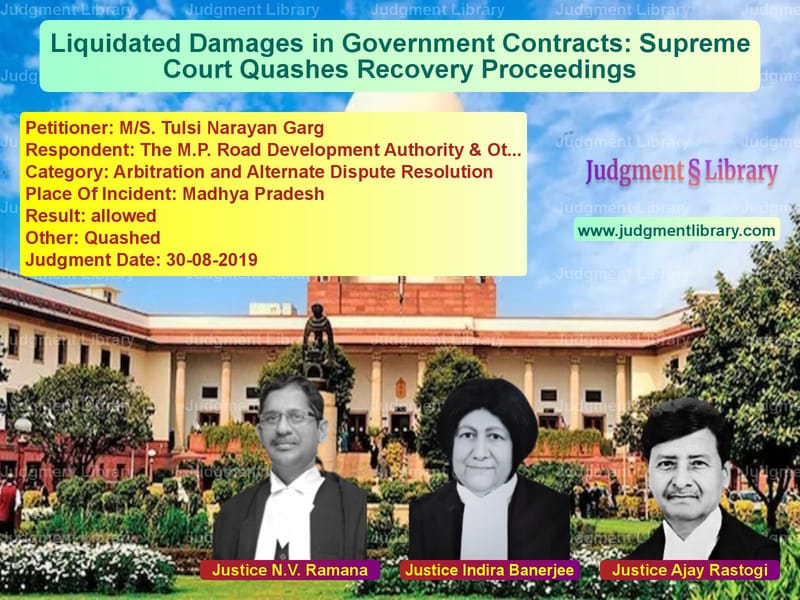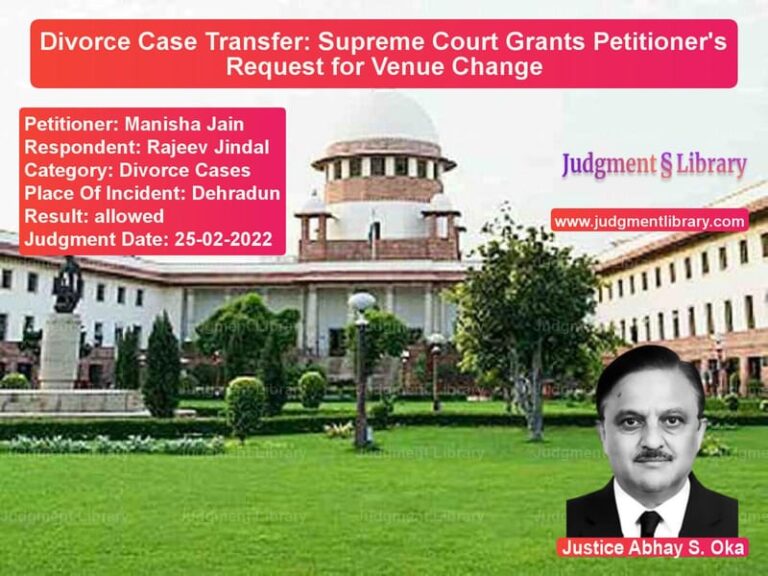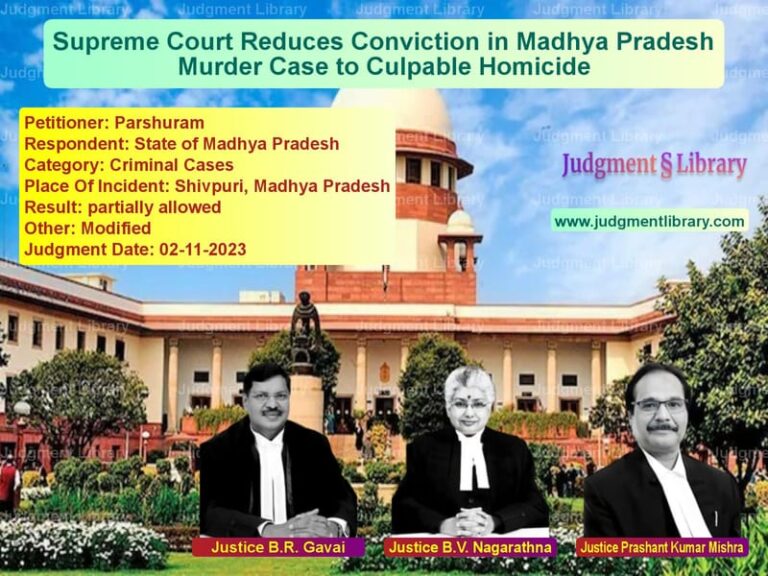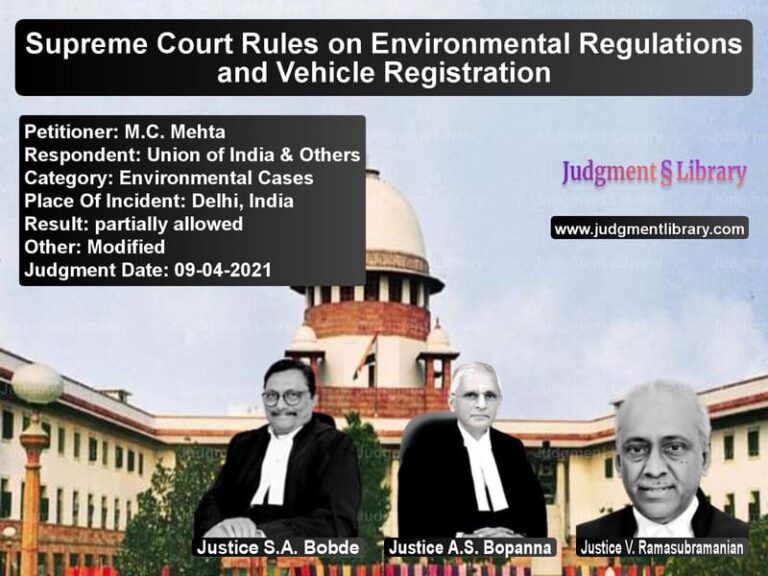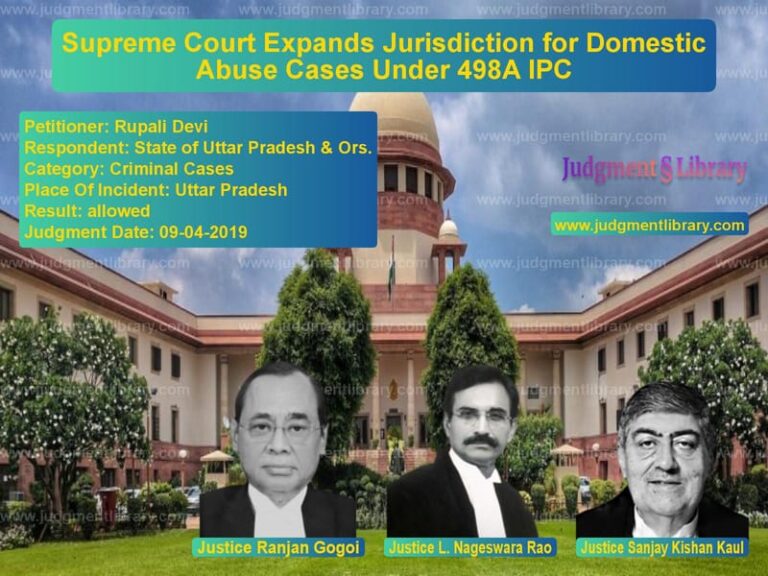Liquidated Damages in Government Contracts: Supreme Court Quashes Recovery Proceedings
The case of M/S. Tulsi Narayan Garg vs. The M.P. Road Development Authority & Others revolves around a contractual dispute concerning the recovery of liquidated damages in government contracts. The Supreme Court’s ruling provides clarity on the applicability of arbitration proceedings and whether government authorities can initiate recovery proceedings before the completion of arbitration.
The primary legal issue was whether the M.P. Road Development Authority could initiate recovery of liquidated damages under the Madhya Pradesh Madhyastham Adhikaran Adhiniyam, 1983, while arbitration proceedings were pending.
Background of the Case
The appellant, M/S. Tulsi Narayan Garg, a registered Class ‘A’ contractor, was awarded a contract for constructing and maintaining rural roads under the Pradhan Mantri Gram Sadak Yojana (PMGSY) in Madhya Pradesh. The contract included the construction of two roads:
- Vijaypur to Chota Kheda (2 km)
- Sonthava to Advad (7.750 km)
The work order was issued on October 6, 2008, and the contract stipulated a completion period of 12 months, making the deadline October 21, 2009. However, due to alleged delays, the M.P. Road Development Authority invoked Clause 52 of the contract and terminated the agreement on October 7, 2013 (for one package) and October 27, 2014 (for the second package).
Petitioner’s Arguments (M/S. Tulsi Narayan Garg)
The appellant contended that:
- The work was delayed due to unforeseen circumstances beyond their control.
- The termination of the contract was unjustified and should be decided by the Arbitral Tribunal under the Madhya Pradesh Madhyastham Adhikaran Adhiniyam, 1983.
- The recovery of liquidated damages initiated by the respondents was premature and should not have been enforced before the arbitration outcome.
- The High Court failed to recognize that the claim for liquidated damages was sub judice and that unilateral recovery by the government authority was legally impermissible.
Respondents’ Arguments (M.P. Road Development Authority & Others)
The respondents countered that:
- The termination was lawful as the contractor failed to complete the work within the stipulated time.
- Under Clause 53.1 of the contract, the authority had the right to quantify and recover liquidated damages.
- The recovery process was in accordance with the agreement, and the appellant had no valid claim against it.
- The arbitration proceedings did not automatically prevent the authority from initiating recovery proceedings.
Lower Court’s Decision
The appellant had initially challenged the recovery proceedings before the Madhya Pradesh High Court. The High Court, in its judgment dated February 26, 2018, ruled in favor of the respondents, allowing the recovery of liquidated damages.
Supreme Court’s Observations
The Supreme Court examined the contractual provisions, including:
- Clause 24: Dispute Redressal System
- Clause 25: Arbitration Mechanism
- Clause 44.1: Liquidated Damages
- Clause 53.1: Payment upon Termination
The Court made the following key observations:
- The dispute over liquidated damages was already pending before the Arbitral Tribunal under Section 7 of the Adhiniyam, 1983.
- The government authority cannot act as a judge in its own cause and unilaterally recover damages while arbitration proceedings are ongoing.
- The High Court failed to consider the principle of adjudication—the matter should have been left to the Arbitral Tribunal for final determination.
- The initiation of recovery proceedings violated natural justice since the contractor had the right to challenge the claim before the arbitrator.
Key Ruling and Verdict
The Supreme Court ruled that:
- The recovery proceedings initiated by the respondents were unjustified and legally unsustainable.
- The High Court’s judgment dated February 26, 2018, was quashed.
- The matter should remain under the purview of the Arbitral Tribunal, which will adjudicate the dispute regarding liquidated damages.
- Pending arbitration, the respondents cannot initiate recovery through land revenue mechanisms.
The Court held:
“A party to a contract cannot be an arbiter in its own cause. The initiation of recovery proceedings without awaiting the outcome of arbitration proceedings violates the principles of fairness and justice.”
Implications of the Judgment
This ruling has significant implications for contract law and government procurement:
- Binding Nature of Arbitration: When arbitration is invoked, government authorities cannot unilaterally enforce recovery.
- Fairness in Recovery Proceedings: Government agencies must follow due process and allow contractors to challenge claims in arbitration.
- Protection for Contractors: Contractors cannot be subjected to financial penalties without a fair hearing.
- Government Liability: Authorities must ensure that liquidated damages claims are judicially determined before enforcement.
The Supreme Court’s decision reinforces the principle that arbitration should be respected as a dispute resolution mechanism and that government authorities cannot bypass it to enforce their claims unilaterally.
Petitioner Name: M/S. Tulsi Narayan Garg.Respondent Name: The M.P. Road Development Authority & Others.Judgment By: Justice N.V. Ramana, Justice Indira Banerjee, Justice Ajay Rastogi.Place Of Incident: Madhya Pradesh.Judgment Date: 30-08-2019.
Don’t miss out on the full details! Download the complete judgment in PDF format below and gain valuable insights instantly!
Download Judgment: MS. Tulsi Narayan G vs The M.P. Road Develo Supreme Court of India Judgment Dated 30-08-2019.pdf
Direct Downlaod Judgment: Direct downlaod this Judgment
See all petitions in Arbitration Awards
See all petitions in Dispute Resolution Mechanisms
See all petitions in Contract Disputes
See all petitions in Judgment by N.V. Ramana
See all petitions in Judgment by Indira Banerjee
See all petitions in Judgment by Ajay Rastogi
See all petitions in allowed
See all petitions in Quashed
See all petitions in supreme court of India judgments August 2019
See all petitions in 2019 judgments
See all posts in Arbitration and Alternate Dispute Resolution Category
See all allowed petitions in Arbitration and Alternate Dispute Resolution Category
See all Dismissed petitions in Arbitration and Alternate Dispute Resolution Category
See all partially allowed petitions in Arbitration and Alternate Dispute Resolution Category

